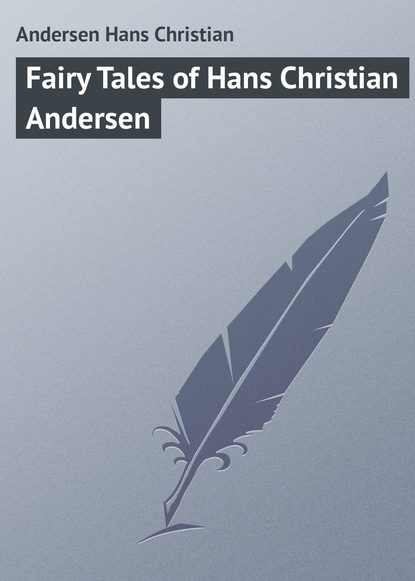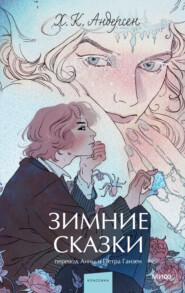По всем вопросам обращайтесь на: info@litportal.ru
(©) 2003-2024.
✖
Fairy Tales of Hans Christian Andersen
Настройки чтения
Размер шрифта
Высота строк
Поля
"You are capitally well-informed," said the man.
"I ought at least to know as much as you," answered the Moor-woman. "Stories and poetry – yes, they're like two yards of the same piece of stuff; they can go and lie down where they like, and one can brew all their prattle, and have it all the better and cheaper. You shall have it from me for nothing. I have a whole cupboard-full of poetry in bottles. It makes essences; and that's the best of it – bitter and sweet herbs. I have everything that people want of poetry, in bottles, so that I can put a little on my handkerchief, on holidays, to smell."
"Why, these are wonderful things that you're telling!" said the man. "You have poetry in bottles?"
"More than you can require," said the woman. "I suppose you know the history of 'the Girl who Trod on the Loaf, so that she might not soil her shoes'? That has been written, and printed too."
"I told that story myself," said the man.
"Yes, then you must know it; and you must know also that the girl sank into the earth directly, to the Moor-woman, just as Old Bogey's grandmother was paying her morning visit to inspect the brewery. She saw the girl gliding down, and asked to have her as a remembrance of her visit, and got her too; while I received a present that's of no use to me – a travelling druggist's shop – a whole cupboard-full of poetry in bottles. Grandmother told me where the cupboard was to be placed, and there it's standing still. Just look! You've your seven four-leaved shamrocks in your pocket, one of which is a six-leaved one, and so you will be able to see it."
And really in the midst of the moor lay something like a great knotted block of alder, and that was the old grandmother's cupboard. The Moor-woman said that this was always open to her and to every one in the land, if they only knew where the cupboard stood. It could be opened either at the front or at the back, and at every side and corner – a perfect work of art, and yet only an old alder stump in appearance. The poets of all lands, and especially those of our own country, had been arranged here; the spirit of them had been extracted, refined, criticised and renovated, and then stored up in bottles. With what may be called great aptitude, if it was not genius the grandmother had taken as it were the flavor of this and of that poet, and had added a little devilry, and then corked up the bottles for use during all future times.
"Pray let me see," said the man.
"Yes, but there are more important things to hear," replied the Moor-woman.
"But now we are at the cupboard!" said the man. And he looked in. "Here are bottles of all sizes. What is in this one? and what in that one yonder?"
"Here is what they call may-balm," replied the woman. "I have not tried it myself. But I have not yet told you the 'more important' thing you were to hear. THE WILL-O'-THE-WISP'S IN THE TOWN! That's of much more consequence than poetry and stories. I ought, indeed, to hold my tongue; but there must be a necessity – a fate – a something that sticks in my throat, and that wants to come out. Take care, you mortals!"
"I don't understand a word of all this!" cried the man.
"Be kind enough to seat yourself on that cupboard," she retorted, "but take care you don't fall through and break the bottles – you know what's inside of them. I must tell of the great event. It occurred no longer ago than the day before yesterday. It did not happen earlier. It has now three hundred and sixty-three days to run about. I suppose you know how many days there are in a year?"
And this is what the Moor-woman told:
"There was a great commotion yesterday out here in the marsh! There was a christening feast! A little Will-o'-the-Wisp was born here – in fact, twelve of them were born all together; and they have permission, if they choose to use it, to go abroad among men, and to move about and command among them, just as if they were born mortals. That was a great event in the marsh, and accordingly all the Will-o'-the-Wisps, male and female, went dancing like little lights across the moor. There are some of them of the dog species, but those are not worth mentioning. I sat there on the cupboard, and had all the twelve little new-born Will-o'-the-Wisps upon my lap. They shone like glow-worms; they already began to hop, and increased in size every moment, so that before a quarter of an hour had elapsed, each of them looked just as large as his father or his uncle. Now, it's an old-established regulation and favor, that when the moon stands just as it did yesterday, and the wind blows just as it blew then, it is allowed and accorded to all Will-o'-the-Wisps – that is, to all those who are born at that minute of time – to become mortals, and individually to exert their power for the space of one year.
"The Will-o'-the-Wisp may run about in the country and through the world, if it is not afraid of falling into the sea, or of being blown out by a heavy storm. It can enter into a person and speak for him, and make all the movements it pleases. The Will-o'-the-Wisp may take whatever form he likes, of man or woman, and can act in their spirit and in their disguise in such a way that he can effect whatever he wishes to do. But he must manage, in the course of the year, to lead three hundred and sixty-five people into a bad way, and in a grand style, too. To lead them away from the right and the truth; and then he reaches the highest point. Such a Will-o'-the-Wisp can attain to the honor of being a runner before the devil's state coach; and then he'll wear clothes of fiery yellow, and breathe forth flames out of his throat. That's enough to make a simple Will-o'-the-Wisp smack his lips. But there's some danger in this, and a great deal of work for a Will-o'-the-Wisp who aspires to play so distinguished a part. If the eyes of the man are opened to what he is, and if the man can then blow him away, it's all over with him, and he must come back into the marsh; or if, before the year is up, the Will-o'-the-Wisp is seized with a longing to see his family, and so returns to it and gives the matter up, it is over with him likewise, and he can no longer burn clear, and soon becomes extinguished, and cannot be lit up again; and when the year has elapsed, and he has not led three hundred and sixty-five people away from the truth and from all that is grand and noble, he is condemned to be imprisoned in decayed wood, and to lie glimmering there, without being able to move; and that's the most terrible punishment that can be inflicted on a lively Will-o'-the-Wisp.
"Now, all this I know, and all this I told to the twelve little Will-o'-the-Wisps whom I had on my lap, and who seemed quite crazy with joy.
"I told them that the safest and most convenient course was to give up the honor, and do nothing at all; but the little flames would not agree to this, and already fancied themselves clad in fiery yellow clothes, breathing flames from their throats.
"'Stay with us,' said some of the older ones.
"'Carry on your sport with mortals,' said the others.
"'The mortals are drying up our meadows; they've taken to draining. What will our successors do?'
"'We want to flame; we will flame – flame!' cried the new-born Will-o'the-Wisps.
"And thus the affair was settled.
"And now a ball was given, a minute long; it could not well be shorter. The little elf-maidens whirled round three times with the rest, that they might not appear proud, but they preferred dancing with one another.
"And now the sponsors' gifts were presented, and presents were thrown them. These presents flew like pebbles across the sea-water. Each of the elf-maidens gave a little piece of her veil.
"'Take that,' they said, 'and then you'll know the higher dance, the most difficult turns and twists – that is to say, if you should find them necessary. You'll know the proper deportment, and then you can show yourself in the very pick of society.'
"The night raven taught each of the young Will-o'-the-Wisps to say, 'Goo-goo-good,' and to say it in the right place; and that's a great gift which brings its own reward.
"The owl and the stork – but they said it was not worth mentioning, and so we won't mention it.
"King Waldemar's wild chase was just then rushing over the moor, and when the great lords heard of the festivities that were going on, they sent a couple of handsome dogs, which hunt on the spoor of the wind, as a present; and these might carry two or three of the Will-o'-the-Wisps. A couple of old Alpas, spirits who occupy themselves with Alp-pressing, were also at the feast; and from these the young Will-o'-the-Wisps learned the art of slipping through every key-hole, as if the door stood open before them. These Alpas offered to carry the youngsters to the town, with which they were well acquainted. They usually rode through the atmosphere on their own back hair, which is fastened into a knot, for they love a hard seat; but now they sat sideways on the wild hunting dogs, took the young Will-o'-the-Wisps in their laps, who wanted to go into the town to mislead and entice mortals, and, whisk! away they were. Now, this is what happened last night. To-day the Will-o'-the-Wisps are in the town, and have taken the matter in hand – but where and how? Ah, can you tell me that? Still, I've a lightning conductor in my great toe, and that will always tell me something."
"Why, this is a complete story," exclaimed the man.
"Yes, but it is only the beginning," replied the woman. "Can you tell me how the Will-o'-the-Wisps deport themselves, and how they behave? and in what shapes they have aforetime appeared and led people into crooked paths?"
"I believe," replied the man, "that one could tell quite a romance about the Will-o'-the-Wisps, in twelve parts; or, better still, one might make quite a popular play of them."
"You might write that," said the woman, "but it's best let alone."
"Yes, that's better and more agreeable," the man replied, "for then we shall escape from the newspapers, and not be tied up by them, which is just as uncomfortable as for a Will-o'-the-Wisp to lie in decaying wood, to have to gleam, and not to be able to stir."
"I don't care about it either way," cried the woman. "Let the rest write, those who can, and those who cannot likewise. I'll grant you an old bung from my cask that will open the cupboard where poetry's kept in bottles, and you may take from that whatever may be wanting. But you, my good man, seem to have blotted your hands sufficiently with ink, and to have come to that age of satiety that you need not be running about every year for stories, especially as there are much more important things to be done. You must have understood what is going on?"
"The Will-o'-the-Wisp is in town," said the man. "I've heard it, and I have understood it. But what do you think I ought to do? I should be thrashed if I were to go to the people and say, 'Look, yonder goes a Will-o'-the-Wisp in his best clothes!'
"They also go in undress," replied the woman. "The Will-o'-the-Wisp can assume all kinds of forms, and appear in every place. He goes into the church, but not for the sake of the service; and perhaps he may enter into one or other of the priests. He speaks in the Parliament, not for the benefit of the country, but only for himself. He's an artist with the color-pot as well as in the theatre; but when he gets all the power into his own hands, then the pot's empty! I chatter and chatter, but it must come out, what's sticking in my throat, to the disadvantage of my own family. But I must now be the woman that will save a good many people. It is not done with my good will, or for the sake of a medal. I do the most insane things I possibly can, and then I tell a poet about it, and thus the whole town gets to know of it directly."
"The town will not take that to heart," observed the man; "that will not disturb a single person; for they will all think I'm only telling them a story if I say, 'The Will-o'-the-Wisp is in the town, says the Moor-woman. Take care of yourselves!'"
THE STORY OF THE WIND
"Near the shores of the great Belt, which is one of the straits that connect the Cattegat with the Baltic, stands an old mansion with thick red walls. I know every stone of it," says the Wind. "I saw it when it was part of the castle of Marck Stig on the promontory. But the castle was obliged to be pulled down, and the stone was used again for the walls of a new mansion on another spot – the baronial residence of Borreby, which still stands near the coast. I knew them well, those noble lords and ladies, the successive generations that dwelt there; and now I'm going to tell you of Waldemar Daa and his daughters. How proud was his bearing, for he was of royal blood, and could boast of more noble deeds than merely hunting the stag and emptying the wine-cup. His rule was despotic: 'It shall be,' he was accustomed to say. His wife, in garments embroidered with gold, stepped proudly over the polished marble floors. The tapestries were gorgeous, and the furniture of costly and artistic taste. She had brought gold and plate with her into the house. The cellars were full of wine. Black, fiery horses, neighed in the stables. There was a look of wealth about the house of Borreby at that time. They had three children, daughters, fair and delicate maidens – Ida, Joanna, and Anna Dorothea; I have never forgotten their names. They were a rich, noble family, born in affluence and nurtured in luxury.
"Whir-r-r, whir-r-r!" roared the Wind, and went on, "I did not see in this house, as in other great houses, the high-born lady sitting among her women, turning the spinning-wheel. She could sweep the sounding chords of the guitar, and sing to the music, not always Danish melodies, but the songs of a strange land. It was 'Live and let live,' here. Stranger guests came from far and near, music sounded, goblets clashed, and I," said the Wind, "was not able to drown the noise. Ostentation, pride, splendor, and display ruled, but not the fear of the Lord.
"It was on the evening of the first day of May," the Wind continued, "I came from the west, and had seen the ships overpowered with the waves, when all on board persisted or were cast shipwrecked on the coast of Jutland. I had hurried across the heath and over Jutland's wood-girt eastern coast, and over the island of Funen, and then I drove across the great belt, sighing and moaning. At length I lay down to rest on the shores of Zeeland, near to the great house of Borreby, where the splendid forest of oaks still flourished. The young men of the neighborhood were collecting branches and brushwood under the oak-trees. The largest and dryest they could find they carried into the village, and piled them up in a heap and set them on fire. Then the men and maidens danced, and sung in a circle round the blazing pile. I lay quite quiet," said the Wind, "but I silently touched a branch which had been brought by one of the handsomest of the young men, and the wood blazed up brightly, blazed brighter than all the rest. Then he was chosen as the chief, and received the name of the Shepherd; and might choose his lamb from among the maidens. There was greater mirth and rejoicing than I had ever heard in the halls of the rich baronial house. Then the noble lady drove by towards the baron's mansion with her three daughters, in a gilded carriage drawn by six horses. The daughters were young and beautiful – three charming blossoms – a rose, a lily, and a white hyacinth. The mother was a proud tulip, and never acknowledged the salutations of any of the men or maidens who paused in their sport to do her honor. The gracious lady seemed like a flower that was rather stiff in the stalk. Rose, lily, and hyacinth – yes, I saw them all three. Whose little lambs will they one day become? thought I; their shepherd will be a gallant knight, perhaps a prince. The carriage rolled on, and the peasants resumed their dancing. They drove about the summer through all the villages near. But one night, when I rose again, the high-born lady lay down to rise again no more; that thing came to her which comes to us all, in which there is nothing new. Waldemar Daa remained for a time silent and thoughtful. 'The loftiest tree may be bowed without being broken,' said a voice within him. His daughters wept; all the people in the mansion wiped their eyes, but Lady Daa had driven away, and I drove away too," said the Wind. "Whir-r-r, whir-r-r-!
"I returned again; I often returned and passed over the island of Funen and the shores of the Belt. Then I rested by Borreby, near the glorious wood, where the heron made his nest, the haunt of the wood-pigeons, the blue-birds, and the black stork. It was yet spring, some were sitting on their eggs, others had already hatched their young broods; but how they fluttered about and cried out when the axe sounded through the forest, blow upon blow! The trees of the forest were doomed. Waldemar Daa wanted to build a noble ship, a man-of-war, a three-decker, which the king would be sure to buy; and these, the trees of the wood, the landmark of the seamen, the refuge of the birds, must be felled. The hawk started up and flew away, for its nest was destroyed; the heron and all the birds of the forest became homeless, and flew about in fear and anger. I could well understand how they felt. Crows and ravens croaked, as if in scorn, while the trees were cracking and falling around them. Far in the interior of the wood, where a noisy swarm of laborers were working, stood Waldemar Daa and his three daughters, and all were laughing at the wild cries of the birds, excepting one, the youngest, Anna Dorothea, who felt grieved to the heart; and when they made preparations to fell a tree that was almost dead, and on whose naked branches the black stork had built her nest, she saw the poor little things stretching out their necks, and she begged for mercy for them, with the tears in her eyes. So the tree with the black stork's nest was left standing; the tree itself, however, was not worth much to speak of. Then there was a great deal of hewing and sawing, and at last the three-decker was built. The builder was a man of low origin, but possessing great pride; his eyes and forehead spoke of large intellect, and Waldemar Daa was fond of listening to him, and so was Waldemar's daughter Ida, the eldest, now about fifteen years old; and while he was building the ship for the father, he was building for himself a castle in the air, in which he and Ida were to live when they were married. This might have happened, indeed, if there had been a real castle, with stone walls, ramparts, and a moat. But in spite of his clever head, the builder was still but a poor, inferior bird; and how can a sparrow expect to be admitted into the society of peacocks?
"I passed on in my course," said the Wind, "and he passed away also. He was not allowed to remain, and little Ida got over it, because she was obliged to do so. Proud, black horses, worth looking at, were neighing in the stable. And they were locked up; for the admiral, who had been sent by the king to inspect the new ship, and make arrangements for its purchase, was loud in admiration of these beautiful horses. I heard it all," said the Wind, "for I accompanied the gentlemen through the open door of the stable, and strewed stalks of straw, like bars of gold, at their feet. Waldemar Daa wanted gold, and the admiral wished for the proud black horses; therefore he praised them so much. But the hint was not taken, and consequently the ship was not bought. It remained on the shore covered with boards, – a Noah's ark that never got to the water – Whir-r-r-r – and that was a pity.
"In the winter, when the fields were covered with snow, and the water filled with large blocks of ice which I had blown up to the coast," continued the Wind, "great flocks of crows and ravens, dark and black as they usually are, came and alighted on the lonely, deserted ship. Then they croaked in harsh accents of the forest that now existed no more, of the many pretty birds' nests destroyed and the little ones left without a home; and all for the sake of that great bit of lumber, that proud ship, that never sailed forth. I made the snowflakes whirl till the snow lay like a great lake round the ship, and drifted over it. I let it hear my voice, that it might know what the storm has to say. Certainly I did my part towards teaching it seamanship.
"That winter passed away, and another winter and summer both passed, as they are still passing away, even as I pass away. The snow drifts onwards, the apple-blossoms are scattered, the leaves fall, – everything passes away, and men are passing away too. But the great man's daughters are still young, and little Ida is a rose as fair to look upon as on the day when the shipbuilder first saw her. I often tumbled her long, brown hair, while she stood in the garden by the apple-tree, musing, and not heeding how I strewed the blossoms on her hair, and dishevelled it; or sometimes, while she stood gazing at the red sun and the golden sky through the opening branches of the dark, thick foliage of the garden trees. Her sister Joanna was bright and slender as a lily; she had a tall and lofty carriage and figure, though, like her mother, rather stiff in back. She was very fond of walking through the great hall, where hung the portraits of her ancestors. The women were represented in dresses of velvet and silk, with tiny little hats, embroidered with pearls, on their braided hair. They were all handsome women. The gentlemen appeared clad in steel, or in rich cloaks lined with squirrel's fur; they wore little ruffs, and swords at their sides. Where would Joanna's place be on that wall some day? and how would he look, – her noble lord and husband? This is what she thought of, and often spoke of in a low voice to herself. I heard it as I swept into the long hall, and turned round to come out again. Anna Dorothea, the pale hyacinth, a child of fourteen, was quiet and thoughtful; her large, deep, blue eyes had a dreamy look, but a childlike smile still played round her mouth. I was not able to blow it away, neither did I wish to do so. We have met in the garden, in the hollow lane, in the field and meadow, where she gathered herbs and flowers which she knew would be useful to her father in preparing the drugs and mixtures he was always concocting. Waldemar Daa was arrogant and proud, but he was also a learned man, and knew a great deal. It was no secret, and many opinions were expressed on what he did. In his fireplace there was a fire, even in summer time. He would lock himself in his room, and for days the fire would be kept burning; but he did not talk much of what he was doing. The secret powers of nature are generally discovered in solitude, and did he not soon expect to find out the art of making the greatest of all good things – the art of making gold? So he fondly hoped; therefore the chimney smoked and the fire crackled so constantly. Yes, I was there too," said the Wind. "'Leave it alone,' I sang down the chimney; 'leave it alone, it will all end in smoke, air, coals, and ashes, and you will burn your fingers.' But Waldemar Daa did not leave it alone, and all he possessed vanished like smoke blown by me. The splendid black horses, where are they? What became of the cows in the field, the old gold and silver vessels in cupboards and chests, and even the house and home itself? It was easy to melt all these away in the gold-making crucible, and yet obtain no gold. And so it was. Empty are the barns and store-rooms, the cellars and cupboards; the servants decreased in number, and the mice multiplied. First one window became broken, and then another, so that I could get in at other places besides the door. 'Where the chimney smokes, the meal is being cooked,' says the proverb; but here a chimney smoked that devoured all the meals for the sake of gold. I blew round the courtyard," said the Wind, "like a watchman blowing his home, but no watchman was there. I twirled the weather-cock round on the summit of the tower, and it creaked like the snoring of a warder, but no warder was there; nothing but mice and rats. Poverty laid the table-cloth; poverty sat in the wardrobe and in the larder. The door fell off its hinges, cracks and fissures made their appearance everywhere; so that I could go in and out at pleasure, and that is how I know all about it. Amid smoke and ashes, sorrow, and sleepless nights, the hair and beard of the master of the house turned gray, and deep furrows showed themselves around his temples; his skin turned pale and yellow, while his eyes still looked eagerly for gold, the longed-for gold, and the result of his labor was debt instead of gain. I blew the smoke and ashes into his face and beard; I moaned through the broken window-panes, and the yawning clefts in the walls; I blew into the chests and drawers belonging to his daughters, wherein lay the clothes that had become faded and threadbare, from being worn over and over again. Such a song had not been sung, at the children's cradle as I sung now. The lordly life had changed to a life of penury. I was the only one who rejoiced aloud in that castle," said the Wind. "At last I snowed them up, and they say snow keeps people warm. It was good for them, for they had no wood, and the forest, from which they might have obtained it, had been cut down. The frost was very bitter, and I rushed through loop-holes and passages, over gables and roofs with keen and cutting swiftness. The three high-born daughters were lying in bed because of the cold, and their father crouching beneath his leather coverlet. Nothing to eat, nothing to burn, no fire on the hearth! Here was a life for high-born people! 'Give it up, give it up!' But my Lord Daa would not do that. 'After winter, spring will come,' he said, 'after want, good times. We must not lose patience, we must learn to wait. Now my horses and lands are all mortgaged, it is indeed high time; but gold will come at last – at Easter.'
"I heard him as he thus spoke; he was looking at a spider's web, and he continued, 'Thou cunning little weaver, thou dost teach me perseverance. Let any one tear thy web, and thou wilt begin again and repair it. Let it be entirely destroyed, thou wilt resolutely begin to make another till it is completed. So ought we to do, if we wish to succeed at last.'
"It was the morning of Easter-day. The bells sounded from the neighboring church, and the sun seemed to rejoice in the sky. The master of the castle had watched through the night, in feverish excitement, and had been melting and cooling, distilling and mixing. I heard him sighing like a soul in despair; I heard him praying, and I noticed how he held his breath. The lamp burnt out, but he did not observe it. I blew up the fire in the coals on the hearth, and it threw a red glow on his ghastly white face, lighting it up with a glare, while his sunken eyes looked out wildly from their cavernous depths, and appeared to grow larger and more prominent, as if they would burst from their sockets. 'Look at the alchymic glass,' he cried; 'something glows in the crucible, pure and heavy.' He lifted it with a trembling hand, and exclaimed in a voice of agitation, 'Gold! gold!' He was quite giddy, I could have blown him down," said the Wind; "but I only fanned the glowing coals, and accompanied him through the door to the room where his daughter sat shivering. His coat was powdered with ashes, and there were ashes in his beard and in his tangled hair. He stood erect, and held high in the air the brittle glass that contained his costly treasure. 'Found! found! Gold! gold!' he shouted, again holding the glass aloft, that it might flash in the sunshine; but his hand trembled, and the alchymic glass fell from it, clattering to the ground, and brake in a thousand pieces. The last bubble of his happiness had burst, with a whiz and a whir, and I rushed away from the gold-maker's house.
"Late in the autumn, when the days were short, and the mist sprinkled cold drops on the berries and the leafless branches, I came back in fresh spirits, rushed through the air, swept the sky clear, and snapped off the dry twigs, which is certainly no great labor to do, yet it must be done. There was another kind of sweeping taking place at Waldemar Daa's, in the castle of Borreby. His enemy, Owe Ramel, of Basnas, was there, with the mortgage of the house and everything it contained, in his pocket. I rattled the broken windows, beat against the old rotten doors, and whistled through cracks and crevices, so that Mr. Owe Ramel did not much like to remain there. Ida and Anna Dorothea wept bitterly, Joanna stood, pale and proud, biting her lips till the blood came; but what could that avail? Owe Ramel offered Waldemar Daa permission to remain in the house till the end of his life. No one thanked him for the offer, and I saw the ruined old gentleman lift his head, and throw it back more proudly than ever. Then I rushed against the house and the old lime-trees with such force, that one of the thickest branches, a decayed one, was broken off, and the branch fell at the entrance, and remained there. It might have been used as a broom, if any one had wanted to sweep the place out, and a grand sweeping-out there really was; I thought it would be so. It was hard for any one to preserve composure on such a day; but these people had strong wills, as unbending as their hard fortune. There was nothing they could call their own, excepting the clothes they wore. Yes, there was one thing more, an alchymist's glass, a new one, which had been lately bought, and filled with what could be gathered from the ground of the treasure which had promised so much but failed in keeping its promise. Waldemar Daa hid the glass in his bosom, and, taking his stick in his hand, the once rich gentleman passed with his daughters out of the house of Borreby. I blew coldly upon his flustered cheeks, I stroked his gray beard and his long white hair, and I sang as well as I was able, 'Whir-r-r, whir-r-r. Gone away! Gone away!' Ida walked on one side of the old man, and Anna Dorothea on the other; Joanna turned round, as they left the entrance. Why? Fortune would not turn because she turned. She looked at the stone in the walls which had once formed part of the castle of Marck Stig, and perhaps she thought of his daughters and of the old song, —
"The eldest and youngest, hand-in-hand,

















